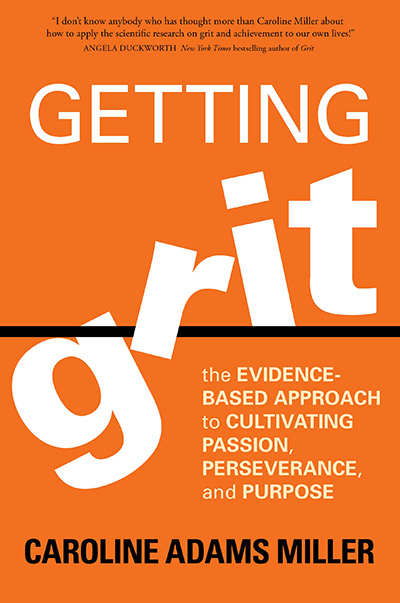
Overcome obstacles and achieve success by tapping into your Authentic Grit — the passionate pursuit of hard goals that inspires you to take positive risks and flourish
—
Earlier in my life, I had the formula for finding success all wrong — and suffered greatly as a result. That is one of the reasons I now feel so compelled to work in the field of motivation, goals, happiness, and grit.
Through failure and an early-adulthood reboot, I learned how to do what was necessary to find the right goals and summon up the perseverance to achieve them. Along the way, I also developed grit. My experience taught me that grit is definitely not a quality reserved for the select few; it is available to anyone who wants something so badly that they won’t let anyone stop them until they’ve gone as far as they can, often achieving or coming close to that which they sought.
As a young girl in a privileged setting in the suburbs of Washington, DC, I was smart and talented according to IQ and other outward measures of success, traits that got me into the ‘right’ schools with the right bumper stickers. But between the emphasis on appearing perfect in my family and the increasing pressures to perform in a variety of academic and extracurricular areas, I ended up trying to protect myself from failure and the appearance of imperfection at all costs.
As a result, I took shortcuts, most notably with food. Instead of being disciplined and healthy in my habits and training, I became bulimic, a condition which was running rampant in my private school and my chosen sport of swimming.
As you may well know, bulimia is an eating disorder characterized by gorging on huge amounts of food followed by behaviors ranging from self-induced vomiting to laxative overdoses.
For seven years, I lived a life of overeating, lying, hiding, and never really paying the full price for my binges, all the while maintaining a passable exterior.
If I was persistent, it was only to make sure that my behavior remained secret and ongoing. Any attempts to stop or seek help were half-hearted, partly because there were no professionals who really knew how to ‘cure’ it, and partly because it felt like a hopeless situation with no end in sight.
I graduated from Harvard University in 1983, and one week later plunged right into marriage. I hit my last bottom when I realized that attaining magna cum laude from an Ivy League school and marrying the handsome man of my dreams wasn’t going to make me happy enough to overcome bulimia.
But in the depth of that misery in early 1984, I found the ingredients I needed to become a ‘paragon of grit’, as Angela Duckworth has kindly noted about my journey, which is chronicled in my TEDx talk, The Moments that Make Champions.
I decided I wanted to live more than I wanted to self-destruct, and that I’d do whatever it took to get better, and that I wasn’t going to stop until I found the right formula.
For the first time, I learned how to persevere through temptation, emotional swings, setbacks, relapses, interpersonal challenges, and life’s unending curveballs. I didn’t resort to anything mood-altering during hard times, including food, alcohol, and recreational drugs; instead, I found ways to just sit with the uncomfortable feelings that I’d always buried.
I shielded myself from people and places that weren’t aligned with my goal of full health, and although I had no specific end date in mind, I just got up every day, week after week, month after month, year after year, and finally decade after decade, and did whatever I needed to do to get better.
Although I didn’t have grit when I started on my journey, there’s no question that I have it now. Because I know that life is sweeter and richer because I chose a difficult road and didn’t quit until I reached a goal that mattered so much to me, I have a commitment to work with people on selecting and pursuing the goals that will light up their lives and help them to cultivate their own inner grit.
Grit starts with passion, and I embraced a passion for living, for finding happiness outside of trying to have a perfect body, and for giving back to others instead of trying to figure out how I could come out the sole winner.
“You can’t keep what you don’t give away” was the phrase I heard at my twelve-step group for compulsive eaters. If I had even one day of maintaining my abstinence from compulsive eating, I had something of value that could help someone else, which gave me purpose and humility. I firmly believed that if I’ve been able to develop grit, others can, too. I also believe that if I don’t “give it away” and help others, I won’t be able to “keep” what I’ve found and fully enjoy it.
I’ve even come up with a term that I use to describe the type of grit I think elicits the greatest results: Authentic Grit — the passionate pursuit of hard goals that awes and inspires others to become better people, flourish emotionally, take positive risks, and live their best lives.
Although authentic grit isn’t a magic wand and won’t solve all problems, I do think making it a priority is the right move for all of us. Too many of us are languishing because we are not shooting for the stars. We are settling for less than what we really want because we don’t have the inner resources and confidence in those resources to sit through sadness or physical pain when we need to. I see lives change in amazing ways when people summon up the willpower to persevere with hard goals. I see them create teams of supportive friendships and serve others with a passionate purpose. I also see regret and misery when people languish.
Here are 10 signs of Authentic Grit:
1. Positive relationships with others
The people who have the quality that makes such a positive difference pull us into their lives in positive ways. They are inclusive, not exclusive. They flourish in their relationships and build other people up. People with authentic grit foster teamwork and camaraderie. Authentic grit is magnetic; you want to associate yourself with someone who is passionate about something in life because you want to feel that way, too.
2. High hope
People with authentic grit are hopeful and optimistic. Although they may not always be correct about what they think they can do, their positive beliefs offer protective benefits. People with this outlook work longer and harder than others and are less likely to quit when challenged. A hopeful mind-set also allows people to generate more potential solutions for accomplishing their goals and makes them believe they can also carry out those solutions..
3. Humility
Authentic grit is also marked by humility, which never promotes itself but rather attracts others. This is the humility of heroism under fire — some selfless act that you don’t learn about until the person passes away. Authentic grit is strikingly devoid of narcissism and the need to be recognized for what one does. Quite the contrary — those with authentic grit know what matters, and don’t need anyone’s approval or praise, nor do they seek publicity to boost their confidence or self-esteem.
4. Self-confidence
Authentic grit is characterized by genuine confidence. People with authentic grit bet on themselves because they know they will have toxic regrets if they don’t give their goals everything they have. Their countenance can be unassuming, but they have a determined mind-set that is known to the people around them.
5. Givers, not takers
Authentic grit is also defined by being the right kind of giver. These men and women don’t give to their own detriment. They primarily surround themselves with those who share their mind-set but are not above mentoring others who lack focus or discipline. So while people with authentic grit are selfish with their time and energy when they have to be, it’s never just all about them because they know that other people matter.
6. Appropriate focus
Authentic grit is focused. People who have this quality aren’t dogged finishers in everything in life. They preserve their self-regulation for what really matters, and don’t waste time on everything that crosses their path. They narrow down what is meaningful to them and have no trouble finishing last in something else or being self-deprecating about something they are not good at.
7. Stubbornness
Authentically gritty people have a certain kind of stubbornness. They use it as a form of ‘alternate rebellion’ because it’s more effective than just being a disruptive troublemaker, a role that some of them have admitted to being before latching onto a focus that gave their lives purpose and meaning. Authentically gritty people can be obstinate, defiant, rebellious, and feisty, but they put that energy to good use when they need to dig deeper for positive goals.
8. Learn from failure
People with authentic grit have experienced disappointment in their goal pursuit, and as a result, they’ve had to learn how to handle defeat, integrate its lessons, and continue on their path.
9. Authenticity
People with authentic grit are comfortable in their own skin. When you meet them, you may not detect special airs, and they are as comfortable being with other people as they are being alone. When they do the difficult, deliberate work that usually accompanies long-term goals, they do it alone and without excuses. They are not perfectionists to such an extreme that they beat themselves up. They know when to have enough self-compassion and wisdom to step away, regroup, refocus, and then return to action.
10. Growth mindset
Finally, people with authentic grit have what is called a ‘growth mindset’ and not a ‘fixed mind-set’. People with a growth mind-set believe that hard work is the key to succeeding; their curiosity and willingness to take risks allows them to explore different approaches and be flexible in goal pursuit. Someone with a fixed mind-set believes that intelligence and talent are finite predictors of success and that getting a quick win is more important than working toward an important outcome.
If I could get grit, you can, too. It’s never too late to get started down the path that will take you exactly as far as you want.
Take the steps necessary to fill your life with authentic grit, and I promise you that you will not only never regret it, you’ll also have nothing but respect for yourself when you’re looking back and asking yourself what you did to make a difference while you could.
You may also enjoy reading Tracking Wonder: Finding Your Unique Value, by Jeffrey Davis
